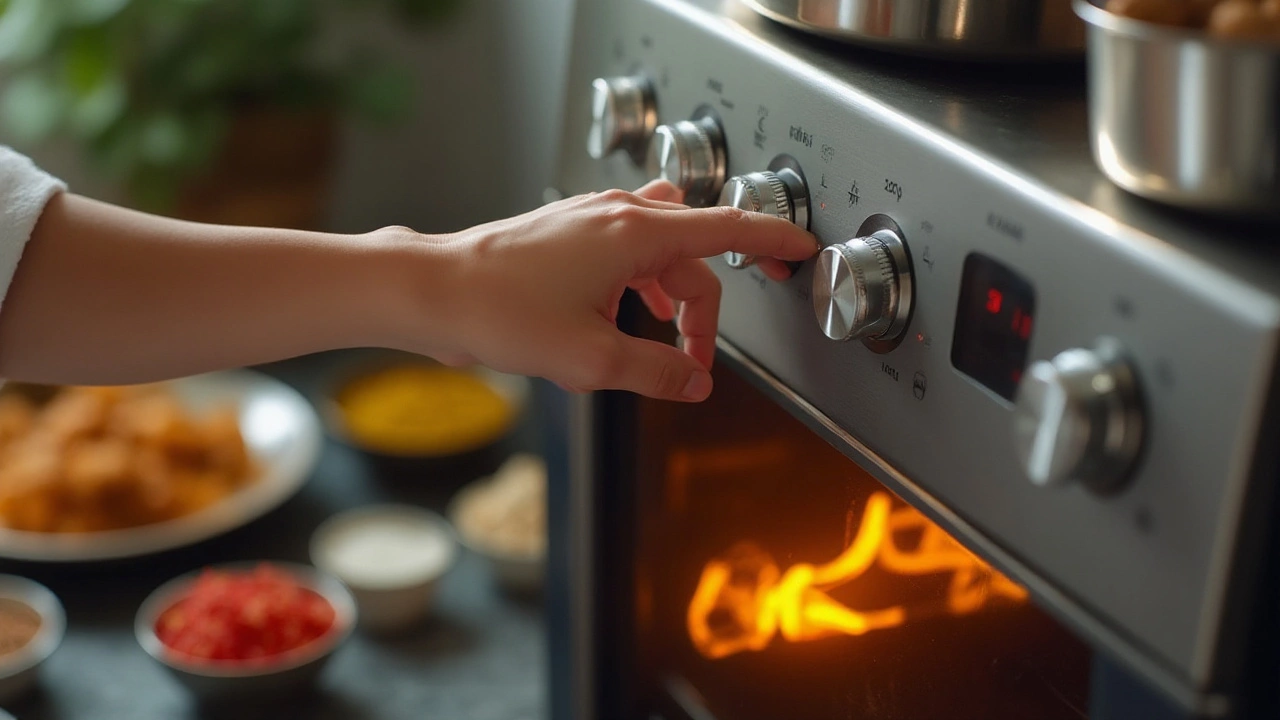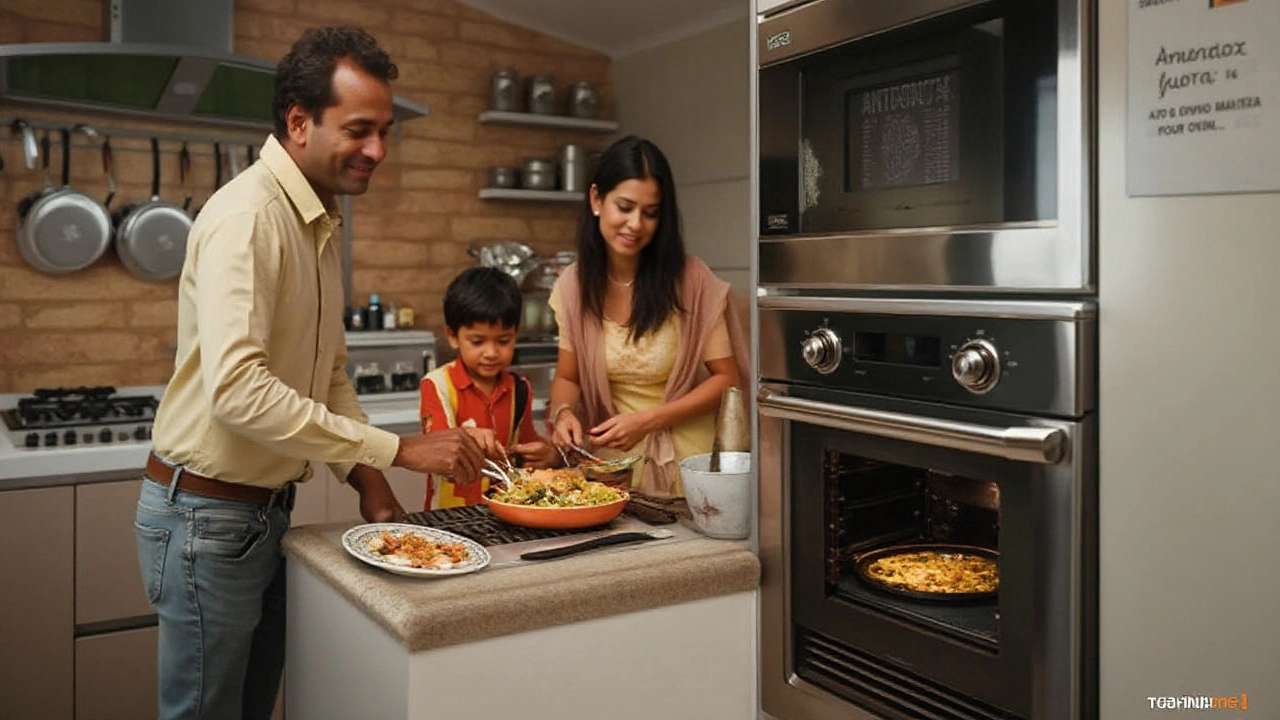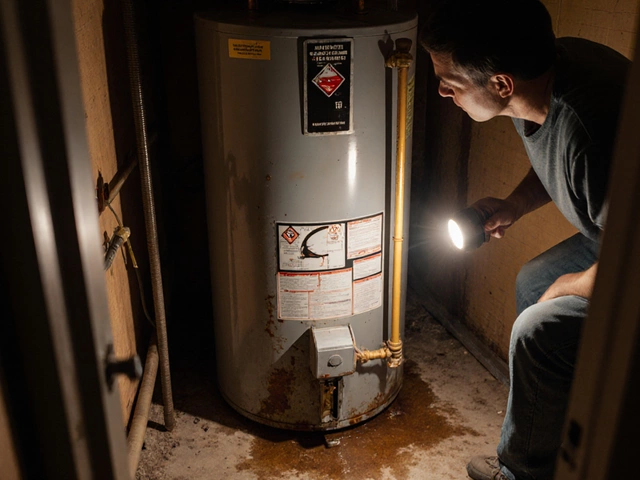The longevity of an electric oven is a common concern for homeowners, especially those who enjoy spending time in the kitchen. On average, most electric ovens can last anywhere from 13 to 15 years with proper care and maintenance. However, several variables can affect this timeline, making it either shorter or extendable. In this exploration, we will unravel the mysteries behind what influences an electric oven's lifespan.
Knowing the typical lifespan of your oven and understanding what factors can wear it out sooner can save you unexpected headaches down the road. Everyday habits, the frequency of usage, and the quality of the appliance itself all play crucial roles in determining how long your oven will serve you well.
Stay tuned as we unpack simple maintenance tips that can keep your oven working efficiently for years to come. We'll also guide you on recognizing tell-tale signs that indicate it might be time to fix or replace your trusty kitchen companion.
Ultimately, a little knowledge goes a long way in preserving the functionality and reliability of your electric oven. Whether you’re contemplating a repair or considering an upgrade, understanding these key elements will help you make the best decision for your kitchen and budget.
- Understanding the Average Lifespan
- Factors Influencing Longevity
- Signs Your Oven Needs Repair
- Maintenance Tips for Long Life
- When to Replace Your Oven
- Choosing a Durable Replacement
Understanding the Average Lifespan
When we discuss the average lifespan of an electric oven, it's essential to consider a myriad of factors that contribute to its duration of service. Electric ovens, being core kitchen appliances, generally boast a lifespan of around 13 to 15 years. This estimate, however, isn't a definitive guarantee. The longevity of an appliance like an electric oven heavily depends on its initial build quality, frequency of usage, and how well it is maintained over the years. Regular maintenance can often extend the lifespan significantly, while negligence can drastically cut it short.
Among various factors, the brand and model play a crucial role in determining how long an oven can last. High-end brands tend to use superior materials and technology, which often translates into a longer lifespan. Consumers often find that spending a bit more upfront on a reliable brand can be cost-effective in the long run. But it's not just about the brand name; the features of the oven, such as self-cleaning options, might sometimes wear down the appliance faster if not used appropriately.
“Maintenance is key to appliance longevity. Regularly check and clean your oven, maintaining it according to the manufacturer’s instructions, and you will significantly increase its lifespan,” notes a report from Consumer Reports, emphasizing the importance of routine upkeep.
It's interesting to note that household habits also influence the lifespan of an electric oven. For instance, an oven in a home where cooking is a daily affair may not last as long as one that is used sparingly. The type of cooking can also impact this; baking at high temperatures or using the grill feature more frequently could contribute to wear and tear. On the contrary, an oven that is mainly used for reheating may see fewer issues, attributing to a longer life.
Further, energy efficiency and the environment play a part. More contemporary models designed with energy-saving technologies not only help reduce electricity bills but also often last longer due to modern engineering that incorporates durable components. But let's not forget that how these appliances are integrated into the kitchen can matter too — good ventilation and adherence to installation guidelines can prevent overheating and extend the lifespan.
On occasions, the lifespan of an oven can be depicted through data. Consider this simplified understanding through a typical lifespan breakdown:
| Condition | Average Lifespan |
|---|---|
| Well-maintained and used sparingly | 15+ years |
| Moderate use with standard maintenance | 13-15 years |
| Heavy use with poor maintenance | 10-12 years |
Thus, an electric oven's expected lifespan serves as a guiding estimate. It offers a general expectation for how long one might consider their purchase reliable and functional. By staying informed and practicing good care habits, you can adjust the timeline of replacing or repairing your beloved kitchen companion, making the most out of every bake, roast, and reheat.
Factors Influencing Longevity
The lifespan of an electric oven is not just a number set in stone; rather, it's shaped by a variety of factors, some of which may surprise you. At the top of the list is the quality of materials used in the oven's construction. High-end models typically employ premium parts and materials designed to withstand the test of time, thus chalking up a longer operational lifespan. In contrast, budget models might use less durable materials that wear down quicker under the same conditions. Additionally, the manufacturer's reputation and commitment to quality control play significant roles. A brand that focuses on durability will often engineer products with components that ensure longevity.
Another crucial factor is how often the oven is used and for what purposes. An oven used daily will naturally experience more wear and tear compared to one used sparingly. Cooking styles also matter; someone who frequently bakes or broils at maximum temperature might find their oven aging faster due to the constant high heat stress on its components. Regular cleaning, while advisable, can also be a double-edged sword. If done incorrectly, it can damage sensitive parts like the heating elements or the thermostat, inadvertently shortening the oven's lifespan. Conversely, neglecting to clean can lead to residue buildup, which can affect performance and longevity.
Maintenance habits contribute significantly to an oven’s lifespan. Systems that undergo routine maintenance checks tend to last longer. It’s wise to adhere to a routine of checking heating elements, ensuring they function correctly, and monitoring the condition of the door seals, hinges, and gaskets. Regular inspections can help spot potential issues before they escalate into costlier repairs or replacements. Sometimes, simple practices like not slamming the oven door or ensuring the racks are not overloaded can preserve the wear and tear on mechanical parts.
The impact of external conditions such as humidity and temperature in the kitchen environment shouldn’t be overlooked. High humidity can lead to rust and corrosion on electronic parts and metal surfaces within the oven. Conversely, very dry conditions can lead to brittleness, particularly in plastic components. Both scenarios can lead to premature failures unless mitigated. Installing the oven in a well-ventilated area and occasionally checking for signs of rust or corrosion can be effective preventative measures.
As renowned appliance expert Jane Worthington once noted, "An oven's durability is as much about what you do as what it's made from. Consistent care outlasts inconsistent urgency, extending the lifespan of your kitchen stalwart."
Technological innovation also factors into longevity. Newer models often come equipped with smart technology that can prevent overheating or monitor diagnostic info, alerting users to potential issues before they become significant problems. Staying informed about your specific model's capabilities can be a gateway to understanding how best to care for it, maximizing every feature while minimizing undue stress.
Expanding on these aspects, it's evident that while the hypothetical 'average lifespan' of an electric oven is a useful guideline, the reality hinges on multiple personal, environmental, and technical factors. Attending to these elements can not only extend the lifespan of your appliance but enhance its performance, ensuring your culinary adventures remain uninterrupted for years to come.

Signs Your Oven Needs Repair
It's not uncommon to lose track of how long you've had your electric oven until it begins showing signs that it's time for a check-up. Catching these warning signals early can save you a lot of trouble and expense down the line. One of the first signs that things might be amiss is if your meals are consistently undercooked or overcooked. This could indicate an issue with the thermostat or heating elements not functioning optimally. When an oven can no longer maintain the correct temperature reliably, it can lead to unpredictable cooking results, often frustrating the home cook. Another telltale sign is the appearance of strange smells during operation, which might suggest electrical issues or even a gas leak in gas-assisted models.
Besides cooking irregularities and odors, unusual noises can also be a sign of trouble. Electric ovens are notoriously quiet, so any grinding, squealing, or banging sounds should grab your attention immediately. These noises often originate from malfunctioning fans or a defective motor struggling against wear and tear. Ensuring the longevity of your appliance involves investigating such disturbances promptly. Electrical problems can pose risks of fire or significant further damage if not addressed. In many cases, these symptoms necessitate a professional repair service to determine the exact cause and solution.
Burning odors should never be ignored, especially if they occur when the oven is off. This can indicate electrical insulation problems where wires may have frayed or are short-circuiting. Broken seals on the door can also affect performance, with heat escaping and leading to inefficient cooking and energy waste. Alongside these more conspicuous signs are subtler hints like buttons or dials not responding correctly. While it might be tempting to ignore such issues, these are often indicative of deeper electrical faults that can exacerbate if unaddressed.
For those unfamiliar with the technical aspects of appliances, recognizing the significance of these signs early is vital. Even a continually flickering light or error codes on digital displays can serve as a distress call from your oven. Proactively addressing these signs with timely maintenance or repairs can prevent more severe issues and extend the life of the appliance. In the words of John Anderson, a seasoned electrician,
"An oven speaking in error codes or refusing to light properly demands your immediate attention—not just for efficiency, but for safety."
In addition to individual signs, when faced with multiple issues simultaneously, it can often point towards the appliance nearing the end of its viable life. It's at this crossroads that serious consideration of repair or replacement surfaces. A meticulous approach by paying heed to the creaks, groans, and aromas of your oven can significantly sway the balance in favor of a repair, sparing the cost and inconvenience of early replacement. Therefore, educate yourself on these vital signs, engage with experts when needed, and make informed decisions about your appliance's future.
Maintenance Tips for Long Life
Keeping your electric oven in prime condition is not only about extending its lifespan but also about ensuring it functions safely and efficiently. Regular maintenance can be the key to avoiding costly repairs or premature replacements. Here’s how you can take steps to maintain your electric oven so that it continues to deliver mouthwatering meals for many years.
Firstly, it's crucial to clean your oven regularly. Although this might seem obvious, many people overlook the importance of ensuring the interior and exterior stay grime-free. Debris and burnt food can build up over time, becoming more than just an eyesore—they can actually impact the oven's performance. It is recommended to perform a deep clean every three to six months, depending on how often you use your oven. Use a non-abrasive cleaner to avoid damaging the oven’s surface. Don't forget about the racks, which can be soaked in warm, soapy water if they are detachable.
An aspect often neglected is checking the oven gaskets. The gasket or seal found around the oven door ensures heat stays inside, promoting even baking and energy efficiency. If these seals become loose or cracked, the oven has to work harder to maintain its temperature, which not only wastes energy but also wears out the appliance faster. A simple visual inspection every few months can prevent such issues. If you notice any gaps, it might be worth calling in a professional to replace the seal.
"Maintaining kitchen appliances, especially ovens, is pivotal for everyday convenience and safety," says Marie Collins, a renowned home appliance expert. "Consistent care not only extends the life of these appliances but also improves their efficiency significantly."
Also, don’t underestimate the power of professional servicing. Scheduling an annual check-up with a certified technician can be beneficial. They can identify potential problems that might not be visible to the untrained eye and ensure that all components are functioning correctly. This can avert unexpected breakdowns and ensure everything is calibrated for optimal performance.
Moreover, consider the way you use your oven. While baking or roasting, try to keep the door closed as much as possible to retain the heat inside. Every time the door is opened, the temperature drops, necessitating the oven to expend more energy to return to the desired level. This repeated action strains the heating elements, potentially leading to quicker wear and tear. It's also important to use recommended cookware as specified by your oven’s manufacturer. Some materials can reflect heat, leading to uneven cooking and a heavier workload on the oven.
Energy-Efficient Usage
Emphasizing energy efficiency not only benefits the environment but also saves money on utility bills. If you find that your electric oven is using more power than usual, it could be due to inefficiencies within the appliance. Regular checks and timely interventions can significantly improve these aspects. An informed approach to energy consumption can also prompt you to adjust your cooking habits. For instance, using residual heat by turning off the oven a few minutes before the food is fully cooked can make a noticeable difference over time.
Finally, consider investing in a surge protector for your electric oven. Power surges, though rare, can be catastrophic to electrical components and circuits within the appliance. A surge protector acts as a barrier, absorbing excess electrical energy and safeguarding your oven from damage. This small investment goes a long way and provides peace of mind knowing your oven is protected against unforeseen electrical anomalies.
These proactive maintenance tips, when diligently followed, can ensure that your appliance longevity is consistently supported, allowing your kitchen to stay as the bustling heart of your home.

When to Replace Your Oven
Deciding when to let go of your electric oven can be a bit tricky, especially if it has been a reliable kitchen companion for years. One of the primary signs that your oven's time might be up is frequent breakdowns. If your repair bills are adding up, it may be a wise financial decision to invest in a new appliance rather than continue to pay for repeated fixes. As ovens age, the cost of maintaining them tends to increase, and newer models might offer energy savings that your current oven does not. Sometimes the decision to replace can come down to simple mathematics; weigh the cost of frequent repairs against the price of a new oven.
Performance issues are another strong indicator. If you're frequently experiencing uneven baking results or it takes significantly longer for meals to cook, it could be a sign that the heating element is failing. While elements can be replaced, in older units this can be symptomatic of more pervasive efficiency problems. This isn't just a matter of convenience; an oven that's struggling to maintain temperature can be a safety hazard, increasing the risk of burnt food or even fires.
Safety Concerns
Safety is a paramount concern when determining an oven's fate. Faulty wiring, an unresponsive thermostat, or persistent burning smells are all red flags that you shouldn't ignore. These issues aren't just nuisances, but potential hazards that could endanger your home. If you notice these issues persisting, it's likely time to consider a replacement. According to a Home Builders Institute study, kitchen appliance fires account for a significant percentage of home fires, with ovens being a major contributor. Safety should never be compromised, especially in a space as central to your home as the kitchen.
Technological advancements in new ovens can often tilt the replacement decision. Modern electric ovens are designed to be more energy efficient, often meaning that they pay for themselves over time through reduced electricity bills. Additionally, with technological integration in the kitchen, newer ovens also feature advanced cooking modes, Wi-Fi connectivity, and smart home compatibility that can make cooking a more seamless and enjoyable experience. If you're still using an oven bought over a decade ago, you could be missing out on these conveniences.
"Many consumers find that upgrading their appliances results in lower energy consumption and more efficient cooking," says Maria Evans, a home appliance analyst at TechView Magazine.
Consider also how your lifestyle might have changed. A larger family or increased cooking frequency may mean that what once was an adequate oven is now ill-suited to your needs. This may prompt considering an upgrade to a larger or double oven for those who host more large gatherings. It's vital to have an oven that aligns both with your culinary demands and lifestyle changes.
Lastly, cosmetic deterioration shouldn't be disregarded. An oven that's seen its fair share of spills, scrapes, and stains may still function, but if it's become an eyesore that detracts from the aesthetics of your kitchen, replacement could be the better choice. The resale value of your home could also be enhanced with newer, more modern appliances.
Choosing a Durable Replacement
When your trusty electric oven finally reaches the end of its journey, or perhaps doesn’t quite meet your needs anymore, the process of choosing a suitable replacement begins. The oven world is brimming with options, each promising to revolutionize your cooking experience. But not all ovens are created equal, and investing in a durable replacement demands more than just a glance at aesthetics or price tags. Here, we'll delve into the essentials of selecting a reliable oven that stands the test of time, focusing on durability, features, and how these align with your cooking lifestyle.
A durable electric oven not only promises oven longevity but saves you a good deal of hassle and money in repairs or premature replacement. Among the first things to consider is the brand reputation. Brands with a long-standing history in the market often have more reliable products. They usually invest heavily in research and development, bringing innovative yet durable appliances to the market. Take, for example, GE and Whirlpool. These names have been synonymous with household appliances for decades, known for crafting devices that many families trust.
Beyond the brand lies the importance of features, particularly those enhancing durability. Stainless steel interiors and self-cleaning functions are more than just bells and whistles. The self-cleaning feature not only makes life easier but also reduces the wear and tear from constant scrubbing, thereby extending the oven lifespan. Moreover, look for ovens equipped with advanced controls. Modern electronics can fail prematurely, but those with well-designed, user-friendly interfaces tend to last longer and offer a better cooking experience.
Considering energy efficiency is another crucial aspect. An oven that consumes less power contributes not only to sustainability but also reduces electricity bills. The Energy Star rating is a trusted guide here. An interesting fact by Energy Star suggests that choosing Energy Star certified products can cut utility bills by up to 30%. A fascinating mix of savings and the goodwill of reduced environmental footprint, isn’t it?
Cost is, undoubtedly, a significant factor. While high-quality models come at a higher price, they often boast features that boost appliance longevity. However, do gauge if the additional features are truly beneficial for your needs or just a marketing gimmick. It might be worth waiting for sales or going for certified refurbished models, which can offer substantial savings without compromising on quality.
Lastly, consider customer reviews and expert recommendations. They offer insight beyond glossy brochures and sales pitches, sharing real-world experiences. A quote from a Consumer Reports guide once noted,
"Choosing the right appliance requires looking beyond price and considering how it’ll integrate with your lifestyle and last long enough to justify its cost."Balancing these insights with personal preference ensures you get an appliance lifespan that satisfies beyond the purchase date.



